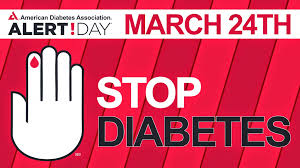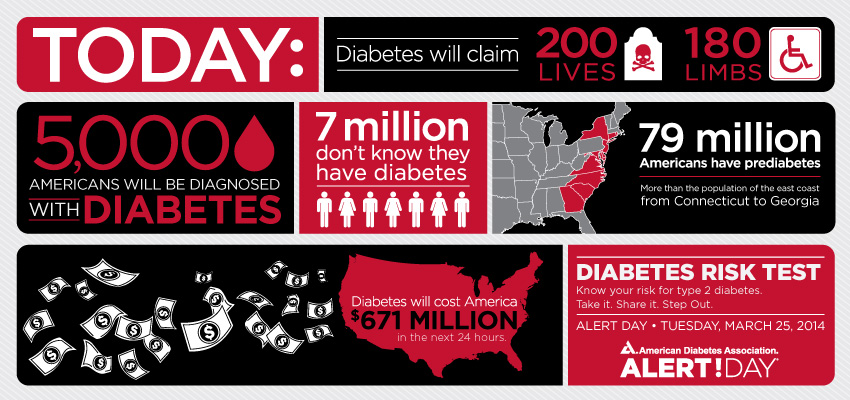Meet Your 2016 – 2018 Strategic Plan and Two AADE Change Champions
I'm excited to share with you my very first AADE 2016 President's letter!
It’s my honor and privilege to serve as your 2016 AADE President. Having spent the entirety of my nearly 40-year career as a registered dietitian in the field of diabetes care and education, I believe wholeheartedly that we are at a critically pivotal point in our profession.
Got Diabetes? Click Open the DOC (Diabetes Online Community)
If you take care of your diabetes or you’re the caregiver for a friend or loved one with diabetes you know it’s a demanding 24/7/365 job. From day to day, even hour to hour, there are endless decisions to make to manage the tightrope of glucose control and stay safe. Over the course of a year most people with diabetes (and caregivers) interact just on occasion with their healthcare providers. You manage, or self-manage, your diabetes primarily on your own.
The good news is that over the last decade technology has increasingly allowed people with diabetes (PWD) and their caregivers to connect online. You’re giving and getting support, offering practical advice, sharing the latest research and technology news and much more.
Dialoging about Diabetes: PWDs Offer Ways to Improve Communication and Care #11 Kelly Kunik
 As a diabetes educator/healthcare provider (DHCP) I’m observing that the rapidly growing world of the Diabetes Online Community, the DOC for short, is helping people with diabetes (PWD) and their loved ones find support and feel supported. People and their caregivers are connecting, building relationships and feeling more positive about the challenges of managing their diabetes. I’m delighted to see this trend continue!
As a diabetes educator/healthcare provider (DHCP) I’m observing that the rapidly growing world of the Diabetes Online Community, the DOC for short, is helping people with diabetes (PWD) and their loved ones find support and feel supported. People and their caregivers are connecting, building relationships and feeling more positive about the challenges of managing their diabetes. I’m delighted to see this trend continue!
As a DHCP I’ve long realized that I can’t walk a mile in a PWD shoes. I can’t know what it is like day in, day out to deal with this challenging and relentless disease. But, what I do know is that we can learn from each other to change the dialog between providers and PWD to be more positive, more supportive. Goal one with these Dialoging about Diabetes interviews with diabetes activists is to help make living with diabetes…just a bit easier. Goal two is to enhance the two-way street – to help more PWD connect and encourage more DHCPs to connect PWD to the value of social networking.
Here’s my dialog with Kelly Kunik, who’s lived with type 1 diabetes (T1D) for 38 years as of Halloween 2015, (which was also her parents’ anniversary). She was diagnosed at the age of 8. Kelly notes, “My greatest weakness (my broken pancreas) has become my greatest strength & biggest passion.” Kelly is a Diabetes Advocate, writer, blogger, speaker, humorist, and consultant. She says, “I laugh every day and am passionately spreading the word about living a great life with diabetes.”
Diabetes Alert Day 2015 - At Risk? Take Action NOW!
 Tuesday March 24, 2015 is the American Diabetes Association's (ADA) annual Diabetes Alert Day. This day kicks-off a four-week campaign which runs through April 21, 2015.
Tuesday March 24, 2015 is the American Diabetes Association's (ADA) annual Diabetes Alert Day. This day kicks-off a four-week campaign which runs through April 21, 2015.
Diabetes Alert Day is THE day each year that ADA sets aside to alert the public to the Diabetes Risk Test. If the results of your risk test indicates you'r at risk, take the next step to know for sure. The goal is for you or your loved one to TAKE ACTION to get diagnosed and care for prediabetes or type 2 diabetes.
I wholeheartedly support this effort. The time for action is now!
The statistics about the prediabetes and type 2 diabetes epidemics are alarming enough to sound the alarm 365 days a year. They show the dent diabetes is making and will continue to make on our health care system, let alone peoples’ lives and longevity!
According to CDC's Diabetes Facts:
- 29 million children and adults are living with diabetes. (This includes about 6 million people who currently have diabetes but have not yet been diagnosed.) Based on the current U.S. population, about 314 million people - roughly 9.5%.
- 86 million people are estimated to have prediabetes placing them at a much greater risk for developing type 2 diabetes. CDC estimates that’s about 35% of all adults over the age of 20 and 51% of adults over 65 years of age (yes, you read that correctly!). Research from CDC shows, unfortunately, that barely 11% of these people know they have it.
- One in three American adults will have diabetes in 2050.
Dialoging about Diabetes: PWDs Offer Ways to Improve Communication and Care #10 Catherine Price
 As a diabetes educator/healthcare provider (DHCP) I’m observing that the rapidly growing world of the Diabetes Online Community, the DOC for short (link to handout), is helping people with diabetes (PWD) and their loved ones find support and feel supported. People and their caregivers are connecting, building relationships and feeling more positive about the challenges of managing their diabetes. I’m delighted to see this trend!
As a diabetes educator/healthcare provider (DHCP) I’m observing that the rapidly growing world of the Diabetes Online Community, the DOC for short (link to handout), is helping people with diabetes (PWD) and their loved ones find support and feel supported. People and their caregivers are connecting, building relationships and feeling more positive about the challenges of managing their diabetes. I’m delighted to see this trend!
As a DHCP I’ve long realized that I can’t walk a mile, or even a few feet, in a PWD shoes. I can’t know what it is like day in, day out to deal with this challenging and relentless disease. But, what I do know is that we can learn from each other to change the dialog between providers and PWD to be more positive, more supportive.
Goal one with my Dialoging about Diabetes interviews is to help make living with diabetes…just a bit easier. Goal two is to enhance the two-way street – to help more PWD connect and encourage more DHCPs to open the doors of social networking to PWD.
Here’s my dialog with Catherine Price, who’s had type 1 diabetes (T1D) since 2001. Catherine engages with the DOC in several ways, writing and blogging for the diabetes site ASweetLife.org, organizing patient advocacy efforts and talking about the DOC at medical and pharma conferences. Beyond being a PWD and doing diabetes-focused consulting work, Catherine is a nationally known journalist. Her work has appeared in publications including The Best American Science Writing, The New York Times, and Slate Magazine. Inspired in part by T1D and her interest in writing about nutrition -- she’s written the new book, Vitamania: Our Obsessive Quest for Nutritional Perfection. But first, enjoy Catherine’s responses to my questions about life with diabetes, the DOC and insights from her new book.
Diabetes Alert Day 2014 - Help Me Sound the Alarm Louder
 Tuesday March 25, 2014 is the American Diabetes Association's Diabetes Alert Day. Though the statistics about the prediabetes and type 2 diabetes epidemics are alarming enough to sound the alarm 365 days a year, Diabetes Alert Day is THE day each year that the American Diabetes Association sets aside to encourage people to TAKE the Risk Test and if need be, TAKE ACTION to diagnose and care for prediabetes or type 2 diabetes NOW. I fully support this effort!
Tuesday March 25, 2014 is the American Diabetes Association's Diabetes Alert Day. Though the statistics about the prediabetes and type 2 diabetes epidemics are alarming enough to sound the alarm 365 days a year, Diabetes Alert Day is THE day each year that the American Diabetes Association sets aside to encourage people to TAKE the Risk Test and if need be, TAKE ACTION to diagnose and care for prediabetes or type 2 diabetes NOW. I fully support this effort!
Yes, the stats are downright scary and clearly show the dent diabetes is and will continue to make in our health care system, let alone peoples’ individual lives and livelihood!
Dialoging about Diabetes: PWDs Offer Ways to Improve Communication and Care #9 Kerri Sparling, author Balancing Diabetes and six
 As a diabetes educator/healthcare provider (DHCP) I’m observing that the rapidly growing world of the Diabetes Online Community, the DOC for short, is helping people with diabetes (PWD) and their loved ones find support and feel supported. People and their caregivers are connecting, building relationships and feeling more positive about the challenges of managing their diabetes. I’m delighted to see this trend!
As a diabetes educator/healthcare provider (DHCP) I’m observing that the rapidly growing world of the Diabetes Online Community, the DOC for short, is helping people with diabetes (PWD) and their loved ones find support and feel supported. People and their caregivers are connecting, building relationships and feeling more positive about the challenges of managing their diabetes. I’m delighted to see this trend!
As a DHCP I’ve long realized that I can’t walk a mile in a PWD shoes. I can’t know what it is like day in, day out to deal with this challenging and relentless disease. But, what I do know is that we can learn from each other to change the dialog between providers and PWD to be more positive, more supportive.
Goal one with these Dialoging about Diabetes interviews with diabetes activists is to help make living with diabetes…just a bit easier. Goal two is to enhance the two-way street – to help more PWD get connected and encourage more DHCPs to open the doors of social networking to PWD.
Here’s my dialog with Kerri Sparling, who’s had type 1 diabetes (T1D) for 27 years. Kerri jumped into the diabetes social networking world early on, in May of 2005 with her blog Six Until Me. She regularly contributes her personal thoughts in her column SUM Musings in the D-newsletter diatribe. She’s been an active member of the ever-expanding Diabetes Online Community (aka The DOC) and a diabetes advocate. Now Kerri has authored a book, Balancing Diabetes. Kerri’s book offers her account and the accounts of others, mainly those with T1D, who work to balance diabetes everyday through all the ins and outs of daily life.
Look AHEAD Results: Please Read Beyond the Headlines
 “The Look AHEAD trial showed no benefit in glucose control." "The Look AHEAD study didn't demonstrate a delay in progression of disease in type 2 diabetes." I heard these two statements while attending the Joslin Diabetes Innovation 2013 in Washington DC, October 3-5. One statement was made by a healthcare provider, the other by a marketing person who does outreach with physicians.
“The Look AHEAD trial showed no benefit in glucose control." "The Look AHEAD study didn't demonstrate a delay in progression of disease in type 2 diabetes." I heard these two statements while attending the Joslin Diabetes Innovation 2013 in Washington DC, October 3-5. One statement was made by a healthcare provider, the other by a marketing person who does outreach with physicians.
They echo the doom and gloom statements summarizing the Look AHEAD study that simply baffle me. But then I remember that the New England Journal of Medicine, in their social media push to publicize the first publication about Look AHEAD (June 27, 2013) since the study was halted about two years early in October 2012, offered up this negative conclusion. This Debbie downer headline then reveberated and snowballed through social media venues for the next 24 hours.
Dialoging about Diabetes: PWDs Offer Ways to Improve Communication and Care #8 Moira McCarthy, Raising Teens with Diabetes
 As a diabetes educator/healthcare provider (DHCP) I’m observing that the rapidly growing world of the Diabetes Online Community, the DOC for short, is helping people with diabetes (PWD) and their loved ones find support and feel supported. People and their caregivers are connecting, building relationships and feeling more positive about the challenges of managing their diabetes. I’m delighted to see this trend!
As a diabetes educator/healthcare provider (DHCP) I’m observing that the rapidly growing world of the Diabetes Online Community, the DOC for short, is helping people with diabetes (PWD) and their loved ones find support and feel supported. People and their caregivers are connecting, building relationships and feeling more positive about the challenges of managing their diabetes. I’m delighted to see this trend!
As a DHCP I’ve long realized that I can’t walk a mile in a PWD shoes (or a parent’s in this case). I can’t know what it is like day in, day out to deal with this challenging and relentless disease. But, what I do know is that we can learn from each other to change the dialog between providers and PWD to be more positive, more supportive.
Goal one with these Dialoging about Diabetes interviews with diabetes activists is to help make living with diabetes…just a bit easier. Goal two is to enhance the two-way street – to help more PWD get connected and encourage more DHCPs to open the doors of social networking to PWD.
Here’s my dialog with Moira McCarthy, mother of Lauren who is now 21 years old. Moira’s daughter Lauren was diagnosed with type 1 diabetes in 1997 at 6 years old.
Dialoging about Diabetes: PWDs Offer Ways to Improve Communication and Care #7 Beverly S. Adler, PhD, CDE
 As a diabetes educator/healthcare provider (DHCP) I’ve observed that the rapidly growing world of the Diabetes Online Community, the DOC for short, is helping people with diabetes (PWD) and their loved ones find support and feel supported. People are connecting, building relationships and feeling more positive about the challenges of managing their diabetes. I’m delighted to see this trend!
As a diabetes educator/healthcare provider (DHCP) I’ve observed that the rapidly growing world of the Diabetes Online Community, the DOC for short, is helping people with diabetes (PWD) and their loved ones find support and feel supported. People are connecting, building relationships and feeling more positive about the challenges of managing their diabetes. I’m delighted to see this trend!
As a DHCP I’ve long realized that I can’t walk a mile in a PWD shoes. I can’t know what it is like day in, day out to deal with this challenging and relentless disease. But, what I do know is that we can learn from each other to change the dialog between providers and PWD to be more positive, more supportive. Goal one with these Dialoging about Diabetes interviews with diabetes activists is to help make living with diabetes…just a bit easier. Goal two is to enhance the two-way street – to help more PWD get connected and encourage more DHCPs to open the doors of social networking to PWD.

